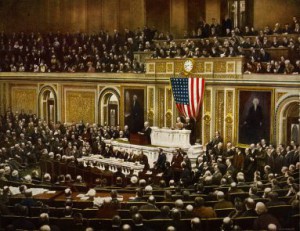
The recent attack in Boston has raised a lot of discussion about how we, as a nation, should confront a real, but shadowy adversary. When do we ignore our constitution to achieve “victory” or “safety”?
Our constitution is an agreement on how government works. It gives us “A government of laws, and not of men”. The Rule of Law means that we have “bright lines” between legal and illegal activity. Officials do not get to choose what they do. The law leaves them little discretion. As officials are constrained, citizens are freed. With the Rule of Law, a reasonable citizen can follow the law and have confidence that he is on the right side of that “bright line”, safe from the arbitrary power of the state.
Our constitution protects the citizen. Our elaborate systems of procedure protect defendants in criminal trials from ambitious prosecutors, corruption, tyranny, and even incompetence. Those procedures keep state power in check. Rules of evidence, mandatory (free) legal representation, public jury trials, a prohibition on double jeopardy (being tried for the same crime twice) are in place to ensure that powerful officials cannot abuse their authority or simply sweep away the rights of citizens on a whim.
So why is there is so much conversation about whether those protections should be relaxed in the case of the Boston bombers?
The reason given is that we are at war. Our adversary has killed thousands of Americans, and even if ill-defined, is very real. For survival in wartime, it is sometimes necessary to temporarily suspend the rules. The constitution is not a “suicide pact”.
From a constitutional standpoint, being “at war” means Congress has passed a formal declaration of war, as specified in Article I, section 8 of the US Constitution.
The last formal declaration of war by the US Congress was on Dec 8, 1941. Every conflict since that time has been conducted by the president, without a formal declaration of war, and frequently with resistance from Congress. Conflicts in Korea, Vietnam, Grenada, Yugoslavia, Iraq, and others have all been conducted on the premise that the “commander in chief” has the constitutional authority to send the US military into battle without explicit congressional authorization.
These recent conflicts have all been fought on foreign soil against nation-states or their proxies. The “war on terror” is different. It is being conducted in part, on US soil. This has raised questions about whether US citizens on US soil can be deprived of basic rights in fighting that war. This is understandable, but because there is no foreseeable end to this war, we must ask how long our “temporary” loss of constitutional protections will last.
Our founders knew that the executive would be tempted by military “adventures”. They also knew that the full support of the people, as affirmed by a vote of the people’s representatives in Congress, would be essential to bearing the great cost of war, in blood and treasure. To varying degrees, presidents from Truman to Obama have acted as though they need not seek congressional approval for their adventures. Looking ahead, think about Syria, Libya, and Iran. It is hard to imagine a declaration of war coming from Congress.
Unfortunately, if a state of war is simply a presidential policy option, then so are our constitutional protections.
It is time to demand answers to these questions: What war-making powers does the president have? What oversight role does Congress have? When and how will our current “global” war end?
George Orwell, in his book “1984” wrote of a society where the people were constantly being driven to greater sacrifice in a world of “perpetual war”. This must not be our future.
If we care about our constitution, we must defend it. We must demand adherence to its checks and balances. We must refuse to allow officials to exercise power they do not properly hold. Every office holder takes an oath to the constitution. If we fail to demand that our officials honor their oaths, our constitution will soon be simply a historical relic, with no more power or relevance than yesterday’s newspaper.

